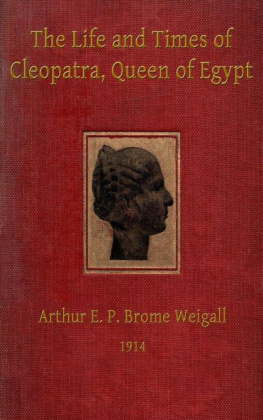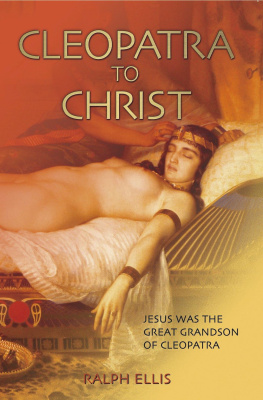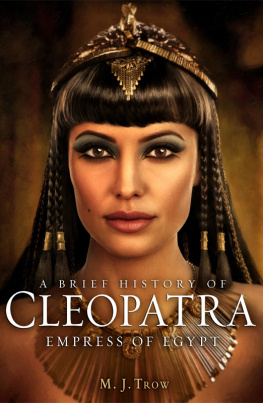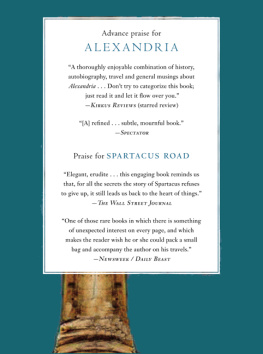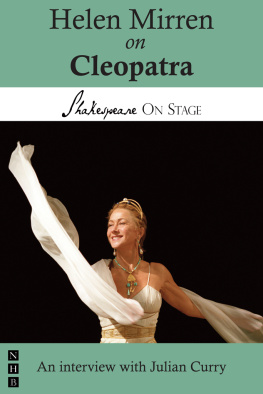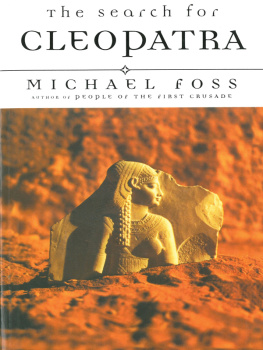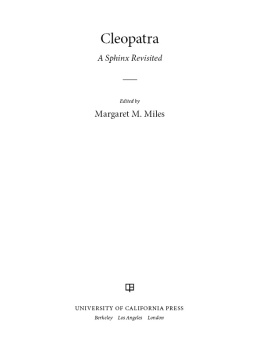Arthur E. P. Brome Weigall - The Life and Times Of Cleopatra: Queen of Egypt
Here you can read online Arthur E. P. Brome Weigall - The Life and Times Of Cleopatra: Queen of Egypt full text of the book (entire story) in english for free. Download pdf and epub, get meaning, cover and reviews about this ebook. year: 1914, publisher: (re-edition) Routledge, genre: Non-fiction / History. Description of the work, (preface) as well as reviews are available. Best literature library LitArk.com created for fans of good reading and offers a wide selection of genres:
Romance novel
Science fiction
Adventure
Detective
Science
History
Home and family
Prose
Art
Politics
Computer
Non-fiction
Religion
Business
Children
Humor
Choose a favorite category and find really read worthwhile books. Enjoy immersion in the world of imagination, feel the emotions of the characters or learn something new for yourself, make an fascinating discovery.
- Book:The Life and Times Of Cleopatra: Queen of Egypt
- Author:
- Publisher:(re-edition) Routledge
- Genre:
- Year:1914
- Rating:5 / 5
- Favourites:Add to favourites
- Your mark:
- 100
- 1
- 2
- 3
- 4
- 5
The Life and Times Of Cleopatra: Queen of Egypt: summary, description and annotation
We offer to read an annotation, description, summary or preface (depends on what the author of the book "The Life and Times Of Cleopatra: Queen of Egypt" wrote himself). If you haven't found the necessary information about the book — write in the comments, we will try to find it.
The Life and Times Of Cleopatra: Queen of Egypt — read online for free the complete book (whole text) full work
Below is the text of the book, divided by pages. System saving the place of the last page read, allows you to conveniently read the book "The Life and Times Of Cleopatra: Queen of Egypt" online for free, without having to search again every time where you left off. Put a bookmark, and you can go to the page where you finished reading at any time.
Font size:
Interval:
Bookmark:
Cleopatra, Queen of Egypt
Histories make men wise. Bacon.
I have no expectation that any man will read history aright who thinks that what was done in a remote age ... has any deeper sense than what he is doing to-day. Emerson.
To philosophise on mankind exact observation is not sufficient.... Knowledge of the present must be supplemented from the history of the past. Taine.
Only the dead men know the tunes the live world dances to. Le Gallienne.
Awake and sing, ye that dwell in dust: for ... the earth shall cast out the dead. Isaiah.
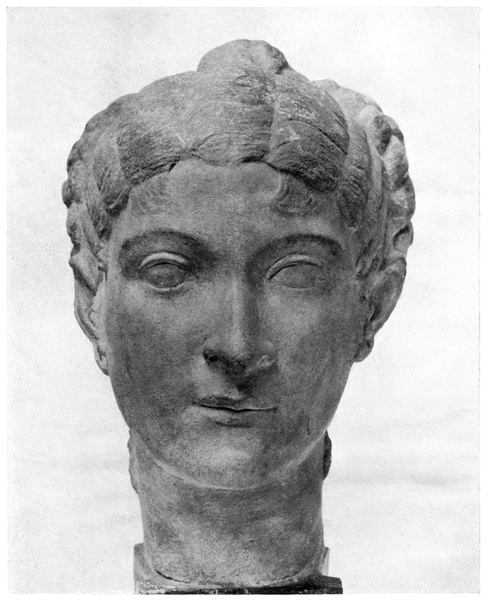
British Museum.]
[Photograph by Macbeth.
CLEOPATRA.
The Life and Times of
Cleopatra, Queen of Egypt
A Study in the Origin
of the Roman Empire
BY
ARTHUR E. P. BROME WEIGALL
INSPECTOR-GENERAL OF ANTIQUITIES, GOVERNMENT OF EGYPT
AUTHOR OF THE LIFE AND TIMES OF AKHNATON, PHARAOH OF EGYPT, THE TREASURE
OF ANCIENT EGYPT, TRAVELS IN THE UPPER EGYPTIAN DESERTS,
A GUIDE TO THE ANTIQUITIES OF UPPER EGYPT, ETC., ETC.
WITH MAPS AND ILLUSTRATIONS
William Blackwood and Sons
Edinburgh and London
1914
ALL RIGHTS RESERVED
I DEDICATE THIS BOOK
TO MY FRIEND OF MANY YEARS,
RONALD STORRS,
ORIENTAL SECRETARY TO THE BRITISH AGENCY IN EGYPT,
SCHOLAR, POET, AND MUSICIAN.
I have to thank most heartily the Honourable Mrs Julian Byng, Mrs Gerald Lascelles, Mr Ronald Storrs, and my wife, for reading the proofs of this volume, and for giving me the benefit of their invaluable advice.
CLEOPATRA
British Museum. Photograph by Macbeth.
PORTRAIT OF A GREEK LADY
The painting dates from a generation later than that of Cleopatra, but it is an example of the work of the Alexandrian artists.
Cairo Museum. Photograph by Brugsch.
SERAPIS: THE CHIEF GOD OF ALEXANDRIA
Alexandria Museum.
POMPEY THE GREAT
Rome. Photograph by Anderson.
JULIUS CSAR
British Museum.
CLEOPATRA
British Museum. Photograph by Macbeth.
JULIUS CSAR
Vatican. Photograph by Anderson.
ANTONY
Vatican. Photograph by Anderson.
OCTAVIAN
Vatican. Photograph by Anderson.
ANTONIA, THE DAUGHTER OF ANTONY
British Museum. Photograph by Macbeth.
CLEOPATRA AND HER SON CSARION
Represented conventionally upon a wall of the Temple of Dendera.
CLEOPATRA.
British Museum. Photograph by Macbeth.
OCTAVIAN
Glyptothek, Munich. Photograph by Bruckmann.
THE NILE
An example of Alexandrian art.
Vatican. Photograph by Anderson.
THE KNOWN WORLD IN THE TIME OF CLEOPATRA
APPROXIMATE PLAN OF ALEXANDRIA IN THE TIME OF CLEOPATRA
GYPTUS
CLEOPATRAS POSSESSIONS IN RELATION TO THE ROMAN WORLD
A MAP ILLUSTRATING THE WAR BETWEEN CLEOPATRA AND OCTAVIAN
In the following pages it will be observed that, in order not to distract the reader, I have refrained from adding large numbers of notes, references, and discussions, such as are customary in works of this kind. I am aware that by telling a straightforward story in this manner I lay myself open to the suspicions of my fellow-workers, for there is always some tendency to take not absolutely seriously a book which neither prints chapter and verse for its every statement, nor often interrupts the text with erudite arguments. In the case of the subject which is here treated, however, it has seemed to me unnecessary to encumber the pages in this manner, since the sources of my information are all so well known; and I have thus been able to present the book to the reader in a style consonant with a principle of archological and historical study to which I have always endeavoured to adherenamely, the avoidance of as many of those attestations of learning as may be discarded without real loss. A friend of mine, an eminent scholar, in discussing with me the scheme of this volume, earnestly exhorted me on the present occasion not to abide by this principle. Remarking that the trouble with my interpretation of history was that I attempted to make the characters live, he urged me at least to justify the manner of their resuscitation in the eyes of the doctors of science by cramming my pages with extracts from my working notes, relevant or otherwise, and by smattering my text with Latin and Greek quotations. I trust, however, that he was speaking in behalf of a very small company, for the sooner this kind of jargon of scholarship is swept into the worlds dust-bin, the better will it be for public education. To my mind a knowledge of the past is so necessary to a happy mental poise that it seems absolutely essential for historical studies to be placed before the general reader in a manner sympathetic to him. History, said Emerson, no longer shall be a dull book. It shall walk incarnate in every just and wise man. You shall not tell me by languages and titles a catalogue of the volumes you have read. You shall make me feel what periods you have lived.
Such has been my attempt in the following pages; and, though I am so conscious of my literary limitations that I doubt my ability to place the reader in touch with past events, I must confess to a sense of gladness that I, at any rate, with almost my whole mind, have lived for a time in the company of the men and women of long ago of whom these pages tell.
Any of my readers who think that my interpretation of the known incidents here recorded is faulty may easily check my statements by reference to the classical authors. The sources of information are available at any big library. They consist of Plutarch, Cicero, Suetonius, Dion Cassius, Appian, De Bello Alexandrino, Strabo, Diodorus Siculus, Livy, Velleius Paterculus, Seneca, Lucan, Josephus, Pliny, Dion Chrysostom, Tacitus, Florus, Lucian, Athenus, Porphyry, and Orosius. Of modern writers reference should be made to Ferreros Greatness and Decline of Rome, Bouch-Leclercqs Histoire des Lagides, Mahaffys Empire of the Ptolemies, Mommsens History of Rome, Stracks Dynastie der Ptolemer, and Sergeants Cleopatra of Egypt. There are also, of course, a very large number of works on special branches of the subject, which the reader will, without much difficulty, discover for himself.
I do not think that my statements of fact will be found to be in error; but the general interpretation of the events will be seen to be almost entirely new throughout the story, and therefore plainly open to discussion. I would only plead for my views that a residence in Egypt of many years, a close association with Alexandria, Cleopatras capital, and a daily familiarity with Greek and Egyptian antiquities, have caused me almost unconsciously to form opinions which may not be at once acceptable to the scholar at home.
To some extent it is the business of the biographer to make the best of the characters with which he deals, but the accusation of having made use of this prerogative in the following pages will not be able to be substantiated. There is no high purpose served by the historian who sets down this man or that woman as an unmitigated blackguard, unless it be palpably impossible to discover any good motive for his or her actions. And even then it is a pleasant thing to avert, where possible, the indignation of posterity. An undefined sense of anger is left upon the mind of many of those who have read pages of condemnatory history of this kind, written by scholars who themselves are seated comfortably in the artificial atmosphere of modern righteousness. The story of the Plantagenet kings of England, for example, as recorded by Charles Dickens in his Childs History of England, causes the reader to direct his anger more often to Dickens than to those weary, battle-stained, old monarchs whose blood many Englishmen are still proud to acknowledge. An historian who deals with a black period must not be fastidious. Nor must he detach his characters from their natural surroundings, and judge them according to a code of morals of which they themselves knew nothing. The modern, and not infrequently degenerate, humanitarian may utter his indignant complaint against the Norman barons who extracted the teeth of the Jewish financiers to induce them to deliver up their gold; but has he set himself to feel that pressing need of money which the barons felt, and has he endeavoured to experience their exasperation at the obstinacy of these foreigners? Let him do this and his attitude will be more tolerant: one might even live to see him hastening to the City with a pair of pincers in his pocket. Of course it is not the historians affair to condone, or become a party to, a crime; but it certainly is his business to consider carefully the meaning of the term crime, and to question its significance, as Pilate did that of truth.
Font size:
Interval:
Bookmark:
Similar books «The Life and Times Of Cleopatra: Queen of Egypt»
Look at similar books to The Life and Times Of Cleopatra: Queen of Egypt. We have selected literature similar in name and meaning in the hope of providing readers with more options to find new, interesting, not yet read works.
Discussion, reviews of the book The Life and Times Of Cleopatra: Queen of Egypt and just readers' own opinions. Leave your comments, write what you think about the work, its meaning or the main characters. Specify what exactly you liked and what you didn't like, and why you think so.

